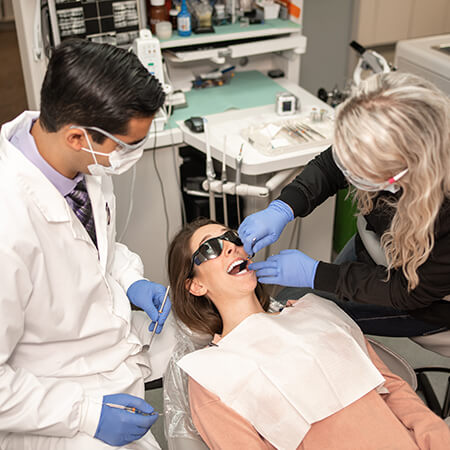As we age our risk for oral disease increases, with advancements in medical technology we’re living longer than we ever have. Good oral health and preventing oral disease are especially critical because each day 10,000 baby boomers turn 65 and basic Medicare doesn’t include dental care, when many people need it most. We will review oral health concerns for older individuals as well as providing some tips for how to improve oral health for all ages.

Recession can simply occur with aging, but may lead to root decay on exposed surfaces.
Dry Mouth
Xerostomia is the feeling of dry mouth due to insufficient secretion of saliva. It is most common among the elderly as a result of adverse effects of drug therapy, head and neck radiation, or autoimmune diseases. Chronic xerostomia has a debilitating effect on the integrity of the hard and soft tissues of the mouth.
It becomes a problem because with less saliva our mouths become more acidic. In an acidic environment decay progresses rapidly. There are multiple products on the market to moisten the mouth, Colgate Hydris, Biotene, Xylimelts etc. While these products certainly help ease the sensation of dry mouth, more is needed to help protect your teeth.
We typically recommend increasing you fluoride exposure. Depending on other risk factors we may suggest a prescription fluoride toothpaste or custom fluoride trays. Adding additional fluoride helps to strengthen your enamel and make it more resistant to decay.
Root Decay
Older adults develop new cavities more often than young adults. As we age, it is common for gums to recede from our teeth. These exposed portions of our root surfaces are not covered with protective enamel, instead they are exposed dentin. Dentin is much softer than enamel so decay on root surfaces progresses much more quickly than decay on other surfaces of the tooth.
The combination of root surface exposure and dry mouth can lead to large amounts of decay in very little time. Similarly to dry mouth we would also recommend fluoride for root exposure, but we would also discuss your homecare. Removing plaque at the gumline is not only important for preventing decay, but it will also slow the advancement of recession. Your hygienist will discuss the best homecare aids for you.

Limited Dexterity
Many seniors experience health challenges that can create obstacles for maintaining good oral hygiene. Certain diseases such as Arthritis, Multiple Sclerosis and Parkinsons (and others) can all affect our ability to brush and floss well. If this is the case a brush with a larger handle or an electric toothbrush may be the best option for you.
A flosser with a long handle may aid you in flossing hard to reach areas. If you’ve noticed you’re having trouble, ask your hygienist to provide you with the best options to brush and floss effectively.
An electric toothbrush and a water flosser, make oral hygiene easier.
References
Institute on Aging – https://www.ioaging.org/aging-in-america
A Place for Mom – https://www.aplaceformom.com/blog/1-18-16-reasons-senior-dental-health-care-is-important/
Tooth Wisdom – https://www.toothwisdom.org/a-z/article/providing-daily-mouth-care-for-loved-ones/
American Dental Association – https://www.ada.org/en/member-center/oral-health-topics/aging-and-dental-health

Meet a practice where dentistry is friendly and patient-focused! Our team members have been part of our practice for many years and have turned making patients feel comfortable into a fine art.

